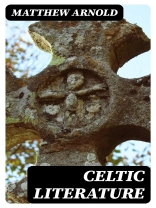In ‘Celtic Literature, ‘ Matthew Arnold embarks on a profound exploration of the rich tapestry of literary traditions stemming from the Celtic regions. The book adeptly combines literary criticism with cultural analysis, examining works from the Irish, Welsh, and Scottish literary canon. Arnold’s stylistic approach is marked by its lyrical prose and nuanced discussions, positioning Celtic narratives within the broader context of 19th-century literature. He delves into themes of myth, identity, and the spiritual undercurrents that characterize Celtic works, illuminating their significance in the evolution of literary expression in England and beyond. Matthew Arnold, a prominent Victorian poet and cultural critic, found inspiration in the Celtic revival of the 19th century, a period that saw a burgeoning interest in folklore and national identity. His background in education and advocacy for the arts likely influenced his desire to elevate Celtic literature in the eyes of contemporary readers. Through his insightful commentary, Arnold not only champions these literary forms but also raises critical questions regarding the role of culture in shaping national consciousness. This book is highly recommended for enthusiasts of literature and cultural history, as it offers a compelling lens through which to appreciate the depth and continuity of Celtic narratives. Arnold’s eloquent analysis will engage scholars and casual readers alike, inviting them to reconsider the value and relevance of Celtic literature in the modern literary landscape.
Sobre el autor
Matthew Arnold (1822–1888) was a distinguished Victorian poet, cultural critic, and an inspector of schools, often remembered for both his profound influence on 19th-century English letters and his incisive societal critiques. Born into an intellectual family—his father was the celebrated headmaster of Rugby School—Arnold’s upbringing was steeped in literary and scholarly pursuits. His works, exemplified by ‘Culture and Anarchy’ and ‘Dover Beach’, reflect a deep engagement with the cultural turmoil and spiritual malaise of his time. In ‘Celtic Literature’, Arnold explores the characteristics and contributions of Celtic art and literature, arguing their significant influence on the European literary tradition. His scholarly approach to literary criticism and his quest for intellectual rigor translated into pioneering essays and lectures that challenged Victorian notions of culture and education. With a style underpinned by a graceful blend of rhetoric and critical scrutiny, Arnold’s legacy endures not only through his poetry but also his profound intellectual inquiries into literature, society, and the human condition.












